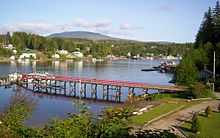Bamfield, British Columbia

Bamfield is a community that is surrounded by Crown Land, Indian Reserves, and portions of the Pacific Rim National Park, located on Barkley Sound, Vancouver Island in British Columbia. The community, with a population of 155 as of 2011,[1] is divided by Bamfield Inlet.
History

Bamfield was populated by Huu-ay-aht of the Nuu-chah-nulth, the local indigenous people. Europeans founded a small fishing community sometime in the late 1800s. Most of the indigenous people now live in the neighboring village of Anacla about 5 kilometers from Bamfield.
Bamfield was named after the first government agent of the area, William Eddy Banfield. The name "Bamfield" with an "m" is said to be either due to how the local first nations people had trouble pronouncing the letter n in his name, or a mistake made by the postal organization. In 1902, the Bamfield cable station was constructed as the western terminus of a worldwide undersea telegraph cable called by some the All Red Line as it passed only through countries and territories controlled by the British Empire, which were coloured red on the map. The cable initially went to Fanning Island, a tiny coral atoll in the mid-Pacific, and from there continued to Fiji, New Zealand, and Australia. A second building, made of concrete was built on the site in 1926 to replace the old wood structure. This building, designated a historic site in 1930, is now used by the Bamfield Marine Sciences Centre.
A Marine and Fisheries lifesaving station on the Pacific coast was established at Bamfield in 1907.[2] It was the first lifesaving station on Canada's Pacific Coast.
In 1953 the cable was extended up the Alberni Inlet to Port Alberni and the local station was closed on June 20, 1959. Following the closure, only the large concrete building, two cable storage tanks and an adjacent building survived, as all the rest were demolished.


Today Bamfield is primarily a tourist destination, either for the West Coast Trail, ocean kayaking or sport fishing. The research activities at the Bamfield Marine Sciences Centre attracts hundreds of researchers every year. The Bamfield Marine Sciences Centre also offers credited university courses through its five associated universities. An out reach program, which provides multi-day immersion field trips for school, college and adult learners, also bring thousands of visitors to the community every year.
Climate
| Climate data for Bamfield | |||||||||||||
|---|---|---|---|---|---|---|---|---|---|---|---|---|---|
| Month | Jan | Feb | Mar | Apr | May | Jun | Jul | Aug | Sep | Oct | Nov | Dec | Year |
| Record high °C (°F) | 18.0 (64.4) |
19.4 (66.9) |
21.7 (71.1) |
25.0 (77) |
31.5 (88.7) |
32.8 (91) |
31.7 (89.1) |
32.0 (89.6) |
31.0 (87.8) |
27.5 (81.5) |
20.0 (68) |
16.5 (61.7) |
32.8 (91) |
| Average high °C (°F) | 7.8 (46) |
9.0 (48.2) |
10.3 (50.5) |
12.0 (53.6) |
14.3 (57.7) |
16.0 (60.8) |
18.1 (64.6) |
18.8 (65.8) |
18.1 (64.6) |
14.1 (57.4) |
10.0 (50) |
7.7 (45.9) |
13.0 (55.4) |
| Daily mean °C (°F) | 4.8 (40.6) |
5.6 (42.1) |
6.5 (43.7) |
8.1 (46.6) |
10.6 (51.1) |
12.6 (54.7) |
14.4 (57.9) |
14.8 (58.6) |
13.6 (56.5) |
10.2 (50.4) |
6.8 (44.2) |
4.8 (40.6) |
9.4 (48.9) |
| Average low °C (°F) | 1.7 (35.1) |
2.1 (35.8) |
2.6 (36.7) |
4.1 (39.4) |
6.8 (44.2) |
9.1 (48.4) |
10.6 (51.1) |
10.8 (51.4) |
9.1 (48.4) |
6.3 (43.3) |
3.5 (38.3) |
1.8 (35.2) |
5.7 (42.3) |
| Record low °C (°F) | −9.4 (15.1) |
−9.5 (14.9) |
−4.0 (24.8) |
−2.2 (28) |
−0.6 (30.9) |
2.2 (36) |
4.4 (39.9) |
4.0 (39.2) |
0.0 (32) |
−3.5 (25.7) |
−9.0 (15.8) |
−10.6 (12.9) |
−10.6 (12.9) |
| Precipitation mm (inches) | 387.7 (15.264) |
344.0 (13.543) |
321.7 (12.665) |
205.1 (8.075) |
144.8 (5.701) |
105.5 (4.154) |
61.2 (2.409) |
75.1 (2.957) |
102.9 (4.051) |
290.6 (11.441) |
443.4 (17.457) |
407.3 (16.035) |
2,889.2 (113.748) |
| Rainfall mm (inches) | 381.6 (15.024) |
339.5 (13.366) |
320.0 (12.598) |
205.0 (8.071) |
144.8 (5.701) |
105.5 (4.154) |
61.2 (2.409) |
75.1 (2.957) |
102.9 (4.051) |
290.6 (11.441) |
441.2 (17.37) |
402.1 (15.831) |
2,869.4 (112.969) |
| Snowfall cm (inches) | 6.1 (2.4) |
4.5 (1.77) |
1.8 (0.71) |
0 (0) |
0 (0) |
0 (0) |
0 (0) |
0 (0) |
0 (0) |
0.1 (0.04) |
2.3 (0.91) |
5.1 (2.01) |
19.9 (7.83) |
| Avg. precipitation days (≥ 0.2 mm) | 21.0 | 19.2 | 20.5 | 18.1 | 14.2 | 11.9 | 8.0 | 7.8 | 10.3 | 17.5 | 22.3 | 21.7 | 192.5 |
| Avg. rainy days (≥ 0.2 mm) | 20.4 | 18.9 | 20.4 | 18.1 | 14.2 | 11.9 | 8.0 | 7.8 | 10.3 | 17.5 | 22.1 | 21.0 | 190.7 |
| Avg. snowy days (≥ 0.2 cm) | 1.5 | 1.2 | 0.78 | 0.04 | 0 | 0 | 0 | 0 | 0 | 0.04 | 0.50 | 1.7 | 5.7 |
| Source: Environment Canada[3] | |||||||||||||
References
- ↑ Population of Bamfield. 2001 Census data.
- ↑ Thomas E. Appleton (2008-03-31). "USQUE AD MARE: A History of the Canadian Coast Guard and Marine Services". Canadian Coast Guard. Archived from the original on 2010-01-04.
- ↑ Environment Canada—Canadian Climate Normals 1971–2000, Retrieved 23 August 2012
External links
- Bamfield Marine Sciences Centre previously Bamfield Marine Station
- Bamfield Chamber of Commerce
- Community Portal
| |||||
Coordinates: 48°49′49″N 125°8′15″W / 48.83028°N 125.13750°W